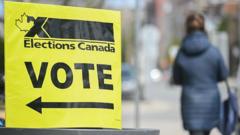Over 7 million Canadians have participated in early voting, marking a significant milestone in the country's electoral history as they prepare for the upcoming federal elections scheduled for April 28.
Record Early Voter Turnout as 7.3 Million Canadians Cast Ballots

Record Early Voter Turnout as 7.3 Million Canadians Cast Ballots
Canadians embrace democratic engagement with unprecedented early voting ahead of crucial elections.
More than 7.3 million Canadians have made their voices heard by casting their ballots early, as reported by Elections Canada, setting an impressive new record for advance voter participation. During the four-day advance voting period, which coincided with the Easter long weekend, polling stations across Canada saw substantial turnout, with two million ballots cast on just the first Friday alone. This surge in early voting represents a remarkable 25% increase compared to the early voting numbers from the 2021 elections.
Mail-in voting has also seen a boost, with over 754,000 Canadians returning their special ballots thus far, surpassing the 660,000 recorded in the last federal election. With less than a week until election day, federal party leaders are intensifying their campaigns as voters consider their options amid a backdrop of trade tensions with the United States and President Donald Trump's controversial statements regarding Canada.
Elections Canada's data indicates that approximately one-quarter of eligible voters have already participated in the election process. Liberal leader Mark Carney, previously the head of the Bank of Canada and the Bank of England, has positioned his party as the appropriate choice to navigate the challenges posed by Trump's trade policies and tariffs. Conversely, Conservative leader Pierre Poilievre has rallied support by emphasizing the desire among Canadians for change after nine years of Liberal governance, focusing on critical issues such as housing affordability and rising living costs.
Carney has criticized Poilievre's lack of a comprehensive plan to counteract the financial pressures stemming from tariffs imposed by the US, which have had detrimental effects on Canada's auto industry. Meanwhile, the Conservative campaign seeks to ride a wave of discontent directed at the current administration, advocating for fiscal prudence and promising a brighter future for Canadians.
Polls indicate that the Bloc Quebecois is currently positioned in third place, advocating for Quebec's autonomy, while the left-leaning New Democratic Party trails behind in the fourth spot. As the election approaches, the landscape of Canadian politics will be shaped by voters' choices regarding their preferred direction for the nation.



















